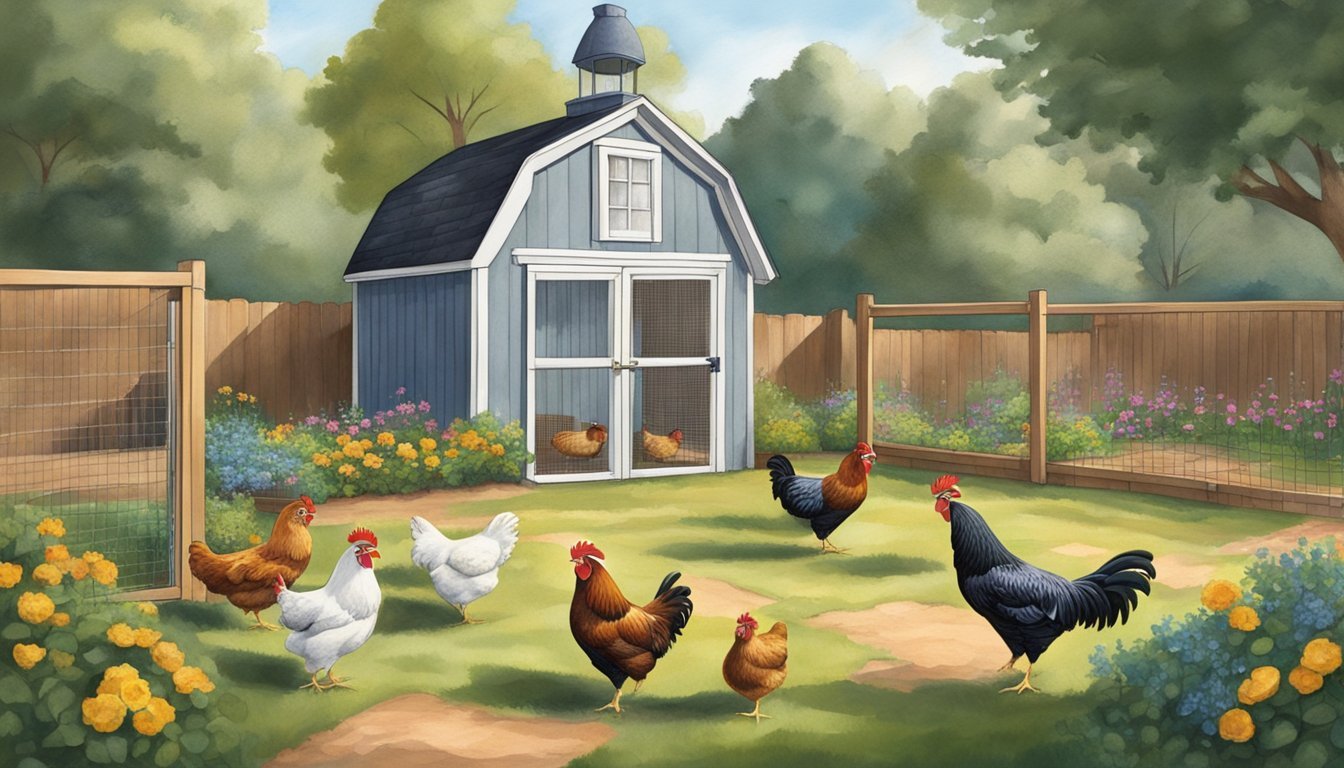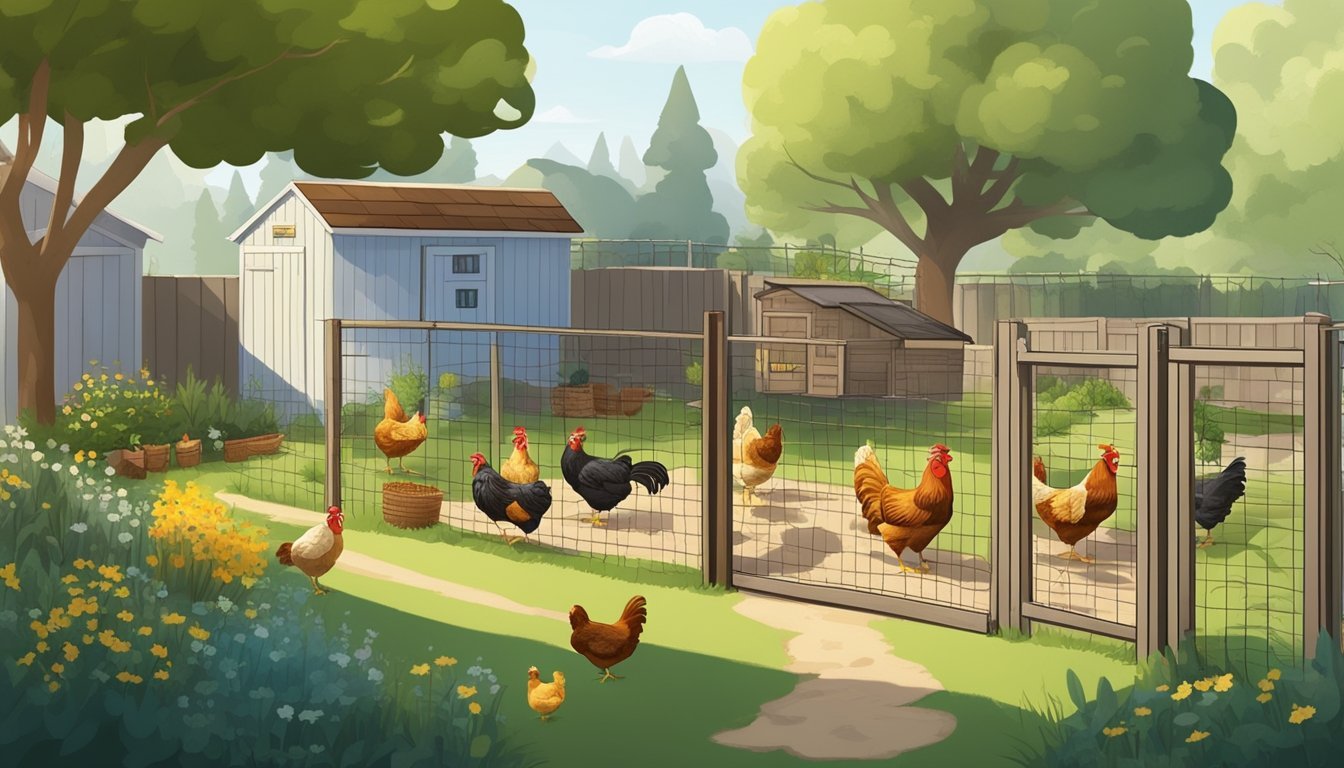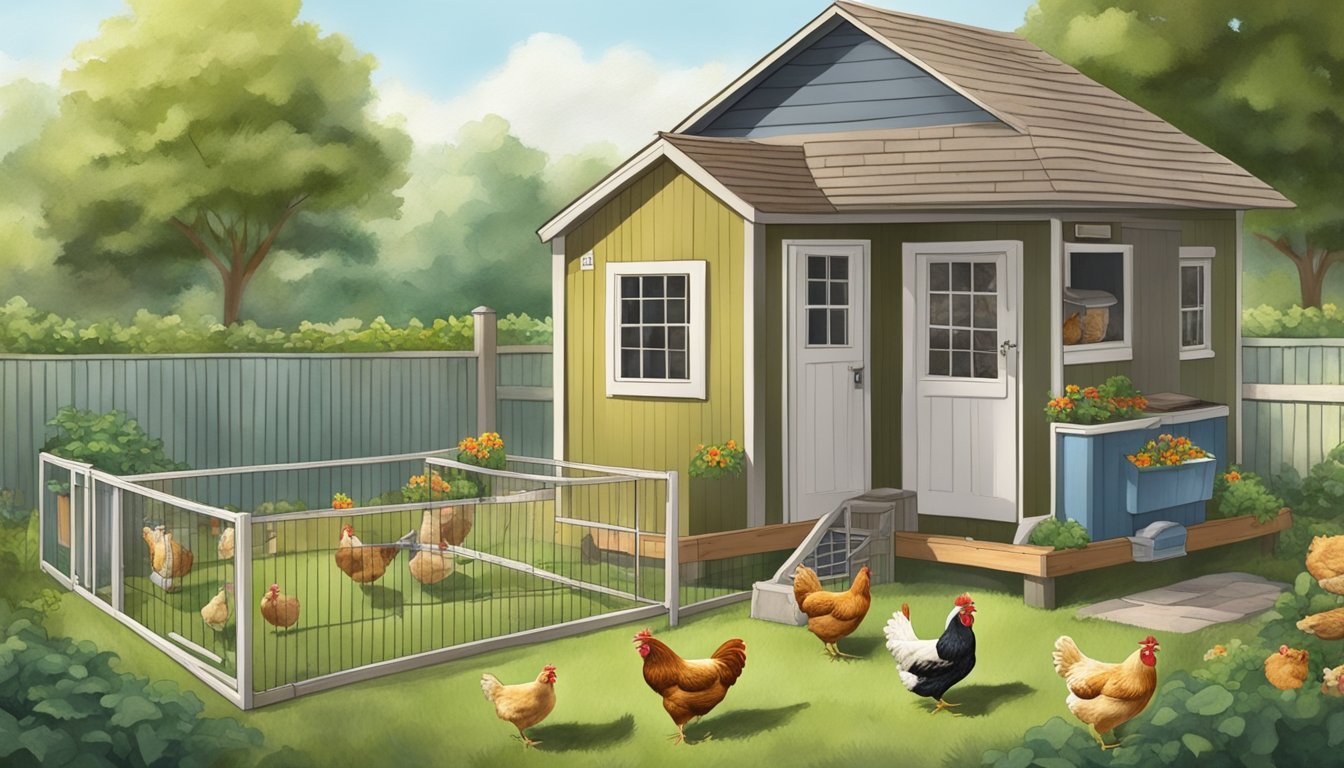Keeping Backyard Chickens in Tyler, TX
Essential Tips for Beginners
Keeping backyard chickens has become an increasingly popular hobby in many urban and suburban areas, offering a personal connection to food sources and the joys of animal husbandry. In Tyler, Texas, local enthusiasts have the opportunity to raise their own chickens thanks to the city's revised ordinances. These regulations are designed to balance the interests of chicken keepers with those of the surrounding community, ensuring that the practice is compatible with residential living.
The city of Tyler has taken steps to accommodate backyard chicken enthusiasts by amending its regulations, which now allow for the keeping of chickens within certain limitations. The Tyler City Council has reduced the setback requirements for chicken coops on residential property, underlining its support for urban farming initiatives. Residents must comply with these updated guidelines, which stipulate the distance chicken coops and pens should be kept from property lines, to foster a harmonious environment.
As with any form of animal husbandry within city limits, would-be poultry keepers in Tyler must adhere to specific ordinances governing the number of chickens allowed and the conditions in which they are kept. These ordinances are in place not only to protect the welfare of the chickens but also to address any potential concerns from neighbors, such as noise and waste management. With a clear understanding of these regulations and a commitment to responsible care, residents of Tyler can enjoy the benefits of raising backyard chickens in a manner that respects the needs of the community.
Understanding Tyler's City Ordinances
Navigating the city ordinances of Tyler, Texas, is crucial for residents considering keeping backyard chickens. The regulations cover several aspects including general fowl rules, specific guidelines for chickens, setbacks from property lines, and the necessary permits.
General Fowl Regulations
Tyler's ordinances stipulate that residents must not allow fowl to run astray within the city limits or within a five thousand feet radius. Keeping any fowl, including chickens, ducks, and turkeys, is regulated to prevent them from becoming a public nuisance.
Specific Backyard Chicken Guidelines
In Tyler, it is particularly important for prospective chicken owners to understand the city-specific guidelines. These rules outline what constitutes lawful keeping of chickens in regard to coop construction, maintenance, and restrictions to certain areas of the city, such as public parks and beaches.
Property Line and Setback Requirements
Under the revised city ordinance, the required setback for chicken coops has been reduced significantly:
Previous Requirement: 50 feet from side and rear property lines
New Requirement: 15 feet from side and rear property lines
This modification eases the space constraints for residents wishing to keep chickens on their property.
Permit and Legal Considerations
Before starting a backyard flock, Tyler residents need to be aware of any permits that may be required. Additionally, ongoing compliance with all city ordinances must be maintained to legally keep and raise chickens. Failure to adhere to these legal stipulations may result in penalties or fines.
Housing Your Backyard Chickens
Before constructing housing for backyard chickens in Tyler, TX, it is essential to consider local ordinances and the specific needs of the birds. Tyler City Council has recently reduced the property setback requirement for chicken coops to 15 feet from side and rear property lines, which allows for more flexibility in backyard layouts.
Designing a Suitable Coop
When designing a coop, providing a sufficient structure that protects chickens from elements and predators is crucial. The coop should have adequate ventilation, insulation for temperature extremes, and perches for roosting. It should also be spacious enough to allow each chicken about 3 to 4 square feet of space inside.
Secure Pen Construction
Adjacent to the coop, a secure pen or run should be constructed with predator-resistant fencing. This outdoor enclosure should give the chickens plenty of room to forage and exercise, complying with the local regulation of 15 feet setback from property lines. The pen should include a roof or covering to prevent predators from entering.
Health and Sanitation
Maintaining the health and sanitation of the chicken habitat is paramount to prevent odors and disease. Regular cleaning of the coop and pen is needed to manage droppings and leftover food. Proper storage of feed and supplies should also be considered to deter pests. Providing a clean, dry, and well-ventilated shelter contributes significantly to the overall health of backyard chickens.
Chickens and the Community
When keeping backyard chickens in Tyler, TX, it's important to consider their impact on the community, including noise and odor management, containment strategies, and local regulations.
Managing Noise and Odors
Keeping chickens in an urban environment like Tyler requires heightened awareness of their potential as a public nuisance. Noise is a primary concern, and residents must be mindful that roosters can cause significant disturbances. The City Council of Tyler does not have specific ordinances against roosters, but noise complaints can be directed to the police chief, currently Jimmy Toler.
Odor control is equally important. One should maintain clean and dry coops to minimize odors, ensuring that waste is regularly removed and properly disposed of to maintain sanitation and community relations.
Dealing with Escapes and Predators
Chicken escapes can cause issues within the community, from traffic disruptions to unwanted interactions with neighborhood dogs and other pets. Chickens can become easy prey for local predators such as dogs, coyotes, or birds of prey. To combat this, secure fencing is mandatory, and the city council recommends a setback of 15 feet from side and rear property lines for coops or pens.
In the event of an escape, residents should have a plan in place to quickly and safely retrieve their chickens. This plan may include arrangements with neighbors or a designated response from animal control services.
Community Relations and Policies
In regards to local policy, the Tyler City Council has eased the requirements for keeping backyard chickens, reducing the setback for coops from 50 feet to 15 feet from property lines. This change reflects a growing understanding of urban agriculture and its place within the community.
It is crucial for residents to maintain open and positive relations with their neighbors when keeping chickens. This includes adhering to city ordinances, being responsive to any concerns about noise or odor, and taking proactive steps to keep chickens contained within their property.
By maintaining a responsible approach to backyard chicken keeping, Tyler residents can contribute positively to their city's sense of community and sustainable living.
Daily Care and Management
In Tyler, Texas, backyard chicken keepers should ensure that their flock receives proper nutrition, consistently fresh water, and adequate shelter to face seasonal challenges. Precise attention to daily routines is vital to maintain healthy birds and productive egg laying.
Feeding and Nutrition
Chickens require a balanced diet to remain healthy and produce quality farm fresh eggs. A typical feeding regimen should include:
Layer Pellets: High in calcium, these are essential for egg-laying hens.
Grit: Helps in digestion, since chickens do not have teeth.
Scratch Grains: A mix of grains to complement their diet, given sparingly.
Greens: To promote natural foraging behaviors.
Water is critical, and it must be clean and unfrozen. In the heat of Tyler's summers, multiple water checks throughout the day ensure chickens stay hydrated.
Egg Harvesting
Egg collection should occur at least once a day. Following these steps ensures peak freshness:
Check nesting boxes daily, morning being the ideal time.
Gently remove eggs and place them in a container.
Store eggs at a consistent, cool temperature to maintain freshness.
Regular collection prevents potential egg eating by chickens and ensures a steady supply of farm fresh eggs.
Handling Fall and Winter Challenges
As the seasons change to fall and winter, chickens require extra care:
Insulation: Ensure the coop is well-insulated against the colder temperatures.
Lighting: Provide supplementary light as daylight hours decrease to maintain egg production.
Protection: Guard against predators who may become bolder as food becomes scarce.
It's important to maintain access to thawed water during cold snaps and ensure the flock has a dry, draft-free environment to roost.
Legal Responsibilities and Considerations
In Tyler, Texas, residents who wish to raise backyard chickens must comply with specific local ordinances to ensure responsible ownership. Adherence to property line setbacks and the understanding of city council regulations are critical for legality and community harmony.
Navigating Local Laws
The Tyler City Council has updated the ordinance related to keeping backyard chickens, significantly reducing the property line setback requirements. Previously, the ordinance mandated a 50-foot setback from the side and rear property lines. Under the revised law, residents now must maintain only a 15-foot setback from these boundaries when situating their chicken coops. Raisers of backyard chickens should verify that their coops comply with this new distance regulation to avoid penalties.
Setback Requirement: 15 feet from side and rear property lines
Previous Regulation: 50-foot setback
City Council Action: Unanimous vote to reduce setback
Impact on Property and Neighbors
The reduction in required distance for chicken coops impacts not only the chicken owners but also their neighbors and the community. Property owners should remain considerate of their neighbors by ensuring that their chickens and related structures do not intrude upon the enjoyment of others' properties or violate any community standards. It is recommended that those raising chickens engage in open communication with neighbors to mitigate any potential issues related to noise, smell, or property use.
Community Relations:
Engage with neighbors
Address potential noise or odor concerns
Maintain coop cleanliness and orderliness
Getting Started with Chickens
Before diving into backyard chicken keeping in Tyler, Texas, one must consider city ordinances and the responsibilities entailed. Starting with the right breeds and understanding daily care are crucial first steps.
Selecting Your Chickens
When selecting chickens for a backyard flock in Tyler, it's important to choose breeds that are well-suited to the local climate and your egg or meat production goals. Bantams, for example, are smaller and may not be the best for egg production but can be easier to handle. Hens do not need a rooster to lay eggs; unless breeding is intended, a flock of hens is sufficient. Not all parts of Tyler allow residents to keep chickens, so reviewing the Tyler Texas Chicken Ordinance is a must before bringing any chickens home.
Understanding the Commitment
Chickens require daily care, including feeding, providing clean water, and regular coop cleaning to prevent disease and maintain a healthy environment. In Tyler, according to the city's ordinance, there are specific restrictions on keeping livestock and fowl on city property, ensuring chickens are kept only on private property where permitted. Prospective chicken keepers must be ready to invest time and resources, understanding that the commitment goes beyond mere setup, impacting schedules and daily routines.
Beyond Basics
After addressing the essentials of backyard chicken keeping in Tyler, it's important to consider more advanced aspects of poultry care, flock management, and community involvement. This section tackles these topics with clarity and detail to ensure successful and responsible backyard chicken endeavors.
Advanced Chicken Care
Maintaining a healthy flock goes beyond food and shelter. Advanced chicken care involves regular health checks, parasite control, and understanding chicken behavior. It's crucial for keepers to recognize signs of distress or illness. Moreover, aligning care practices with changing seasons is imperative for their wellbeing. For instance, securing coops against predators and implementing weather-appropriate modifications keeps chickens safe and comfortable year-round.
Expanding Your Flock
When considering expanding your flock, Tyler residents must be aware of the Tyler City Council's regulations, which require a minimum lot size to ensure adequate space. Before adding new birds, one must evaluate the coop size and the available space per chicken. It's recommended that there be at least 10 square feet of outdoor run space per chicken. Additionally, introducing new birds gradually helps in establishing a peaceful pecking order and reduces stress.
Community Engagement and Education
Community engagement and education are vital for sustainability and legal compliance in keeping backyard chickens. Tyler's residents have an opportunity to share knowledge and experiences to foster a supportive environment. Education about the proper keeping of chickens, including local regulations on lot size and allowable livestock, excluding hogs and cattle, is fundamental. The community benefits from workshops and local farm visits that facilitate learning about best practices in backyard poultry care.
Conclusion
The impact of the revised ordinance by the Tyler City Council has created a more accessible environment for residents interested in urban agriculture. With the reduction of property setback requirements from 50 feet to 15 feet for side and rear property lines, keeping backyard chickens and other fowl has become a feasible practice for more citizens.
Residents are encouraged to take advantage of this opportunity, which supports sustainability and local food production. It is, however, important for potential and current chicken owners to remain informed about the specific guidelines to ensure they are in full compliance with city regulations.
Moreover, the community's engagement in backyard chicken keeping is expected to instigate a wave of education on responsible fowl management and the benefits it can bring. This ordinance adjustment signifies the City of Tyler's forward-thinking approach in adapting to the evolving interests and practical needs of its residents.
Those considering joining the growing trend of backyard poultry must also consider the responsibilities that come with it, including proper care, coop management, and neighborhood considerations to maintain harmonious relationships.
With careful adherence to these regulations, Tyler residents can look forward to integrating the joys and advantages of backyard chickens into their daily lives, thereby contributing to a more sustainable and self-reliant community.







